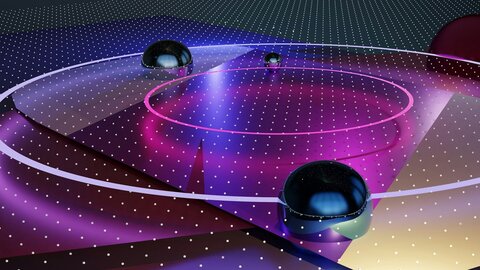AI systems built on deep neural networks alone have so far mostly been black-box systems, where it is difficult to understand how the output is related to the input, for example, what exactly causes an image to be classified one way or another. This might be good enough for some applications, like weather apps, for example. In research, however, we want to understand how we arrive at a particular result. That's what we also want from an AI in the future. One possibility would be to use the funds from the FWF Wittgenstein Award to further develop transparent, explainable AI in basic research, particularly in quantum physics.
Why is this research particularly relevant?
Briegel: It contributes to a better understanding of the principal scope of artificial intelligence. Will it remain primarily an optimization and classification tool, or can it be developed significantly further – is there more to come? One key question is whether artificial agents are theoretically capable of creating models themselves. Creating models is a skill we use to summarize our experiences, make predictions, test them in new experiments, and help us make sense of the world. It is part of the basic underpinnings of what we call understanding. If we had AI systems that could learn by creating their own models and also communicate those models, that would be a big step forward.
What motivates you in your work?
Briegel: As a physicist, naturally I want to understand what intrinsically holds the world together (laughs). In the past, my research activities have also been characterized by extensive interaction with other disciplines – especially with philosophy. Thomas Müller at the University of Konstanz and I are investigating, for example, how to better understand the idea of freedom and agency in the context of quantum physics. This is a philosophical question, but I think that physics can contribute something to answering it. Quantum mechanics is the first physical theory in which the role of the observer is described mathematically in a formal way. However, it’s not clear what constitutes an “observer”, and whether the term really conveys the entire meaning. After all, experimenting is more than just observing. A better question, then, is what constitutes a system with the capability to act and how do artificial learning agents fit into this classification? This is a crucial question in terms of the development of artificial intelligence and what it will mean for us.
Hans J. Briegel is a professor and head of the research group Quantum Information & Computation at the Institute for Theoretical Physics at the University of Innsbruck. He studied physics and philosophy in Munich and Edinburgh. Other stages in his career include a postdoctoral fellowship at Harvard University, a visiting professorship at the University of Konstanz, and many years of leading a research group as Scientific Director at the Institute of Quantum Optics and Quantum Information (IQOQI) of the Austrian Academy of Sciences (OeAW) in Innsbruck. 2022 Hans Briegel was awarded an ERC Advanced Grant.






